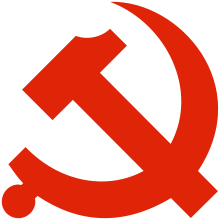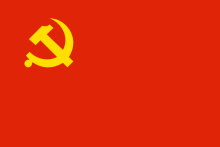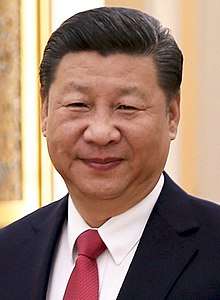General Secretary of the Communist Party of China
| General Secretary of the Central Committee of the Communist Party of China 中国共产党中央委员会总书记 | |
|---|---|
 Logo of the Communist Party of China | |
 Flag of the Communist Party of China | |
| Central Committee of the Communist Party of China | |
| Type | Party leader, Paramount leader |
| Reports to | National Congress of the Communist Party of China |
| Seat | Qinzheng Hall, Zhongnanhai, Beijing[1][2] |
| Nominator | Central Committee of the Communist Party of China |
| Appointer | Central Committee of the Communist Party of China |
| Term length | Five years, no term limit |
| Constituting instrument | Constitution of the Communist Party of China |
| Inaugural holder |
Chen Duxiu (1925) Hu Yaobang (1982) |
| Formation |
January 1925 September 1982 |
| General Secretary of the Communist Party of China | |||||||
| Simplified Chinese | 中国共产党中央委员会总书记 | ||||||
|---|---|---|---|---|---|---|---|
| Traditional Chinese | 中國共產黨中央委員會總書記 | ||||||
| |||||||
| Commonly abbreviated as | |||||||
| Simplified Chinese | 中共中央总书记 | ||||||
| Traditional Chinese | 中共中央總書記 | ||||||
| |||||||
The General Secretary of the Central Committee of the Communist Party of China (Chinese: 中国共产党中央委员会总书记) is head of the Communist Party of China and the highest-ranking official within the People's Republic of China.[3] The General Secretary is a standing member of the Politburo and head of the Secretariat. The officeholder is usually considered the "paramount leader" of China.[4]
According to the Constitution, the General Secretary serves as an ex officio member of the Politburo Standing Committee, China's de facto top decision-making body.[5] Since the early 1990s, the holder of the post has been, except for transitional periods, the Chairman of the Central Military Commission, making the holder the Supreme Military Command of the People's Liberation Army.[lower-alpha 1]
The current General Secretary is Xi Jinping, who took office on 15 November 2012 and was re-elected on 25 October 2017.[lower-alpha 2]
Powers and position
Since the abolition of the post of Chairman of the Communist Party of China by the 12th Central Committee in 1982, the General Secretary is the highest-ranking official of the party and heads the Central Secretariat, Political Bureau and its Standing Committee.
Since its revival in 1982, the post of General Secretary has been de jure the most important post in the PRC, though it did not become the de facto most important post until Deng Xiaoping's retirement in 1990. As China is a de facto one-party state, the General Secretary holds ultimate power and authority over state and government. However, the men who have held the post have held far less power than Chairman Mao Zedong. Since the mid-1990s, the General Secretary has traditionally also held the post of President of the PRC. While the presidency is nominally a ceremonial post, it is customary for the General Secretary to assume the presidency to confirm his status as de jure head of state.
Since Xi Jinping's ascendance to power, two new bodies of the Communist Party, the National Security Commission and Central Leading Group for Comprehensively Deepening Reforms, have been established, ostensibly concentrating political power in the "paramount leader" to a greater degree than anyone since Deng.[7] These bodies were tasked with establishing the general policy direction for national security as well as the agenda for economic reform. Both groups are headed by the General Secretary, that the power of the General Secretary has become more concentrated.[8]
List of general secretaries
See also
Notes
- ↑ Xi Jinping, 59, was named general secretary of the 82-million-member Communist Party and is set to take over the presidency, a mostly ceremonial post, from Hu Jintao in March.[6]
- ↑ "Xi's here to stay: China leader tipped to outstay term". Daily Mail. 9 August 2016.
"A lot of analysts now see it as a given" that Xi will seek to stay party general secretary, the country's most powerful post, said Christopher K. Johnson, a former CIA analyst and now China specialist at the Washington-based Center for Strategic and International Studies.
References
Citations
- ↑ "文革后的中南海:中央办事效率最高的时期". LYWZC.com. Comsenz Inc. Retrieved 7 February 2018. .
- ↑ Li, Xiaoqing (2015-06-10). "卓琳以死相逼之前 曾被江泽民一度糊弄". Epoch USA, Inc. The Epoch Times. Retrieved 10 February 2018.
- ↑ Chris Buckley and Adam Wu (10 March 2018). "Ending Term Limits for China's Xi Is a Big Deal. Here's Why. - Is the presidency powerful in China?". New York Times.
In China, the political job that matters most is the general secretary of the Communist Party. The party controls the military and domestic security forces, and sets the policies that the government carries out. China’s presidency lacks the authority of the American and French presidencies.
- ↑ "China's 'Chairman of Everything': Behind Xi Jinping's Many Titles". The New York Times. 25 October 2017.
Mr. Xi’s most important title is general secretary, the most powerful position in the Communist Party. In China’s one-party system, this ranking gives him virtually unchecked authority over the government.
- ↑ Chapter III Central Organizations of the Party - Article 22
- ↑ Who’s Who in China’s New Communist Party Leadership Lineup - Bloomberg
- ↑ 习近平频现身成常态 将回归"领导核心"?. Duowei News. January 7, 2014.
- ↑ "How the Chinese government works". South China Morning Post.
Xi Jinping is the most powerful figure in China's political system, and his influence mainly comes from his position as the General Secretary of the Chinese Communist Party.
Sources
- China Online Encyclopedia

.svg.png)
